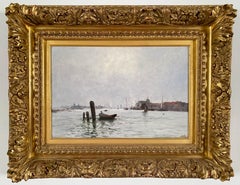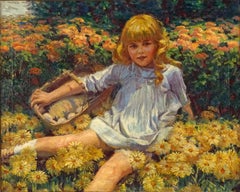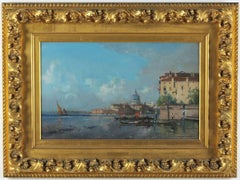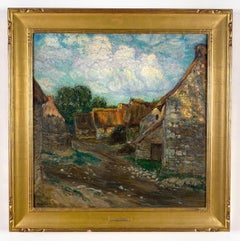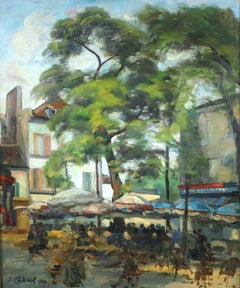Berkshires - Landscape Paintings
to
1
18
32
38
36
Overall Width
to
Overall Height
to
1
22
99
3
4
5
7
2
3
12
8
1
43
38
12
9
5
4
2
116
5
4
61
16
14
12
9
6
6
6
6
5
4
3
3
3
3
3
2
2
2
2
125
125
1
1
1
9
5
2
2
2
93
23,248
22,714
Item Ships From: Berkshires
Septembre, La Meuse a Dordrecht
By Marie Joseph Léon Clavel
Located in Sheffield, MA
“I Will”, Marie-Joseph-Leon-Clavel
French, 1850-1923
Septembre, La Meuse a Dordrecht
Oil on canvas, Signed
13 ¼ by 19 ½ in. W/frame 23 ¼ by 29 ½ in.
Marie-Joseph-Leon-Clavel took ...
Category
1890s Post-Impressionist Berkshires - Landscape Paintings
Materials
Oil
Young Girl Resting in a Bed of Flowers
Located in Sheffield, MA
James George Weiland
American, 1872-1968
Young Girl Resting in a Bed of Flowers
Oil on canvas
24 by 30 in. W/frame 30 by 36 in.
Signed lower left...
Category
1910s American Impressionist Berkshires - Landscape Paintings
Materials
Oil
Vue De Venise
By Henri Duvieux
Located in Sheffield, MA
Henri Duvieux
French, 1855 – 1920
Vue De Venise
Oil on canvas
15 ¾ in. by 25 ½ in. W/frame 25 ¾ by 35 ½ in.
Signed lower right
Henri Duvieux was an artist influenced by the intere...
Category
1880s Post-Impressionist Berkshires - Landscape Paintings
Materials
Oil
$12,800
Brittany
Located in Sheffield, MA
Edward Francis Rook
American, 1870-1960
Brittany
Oil on Canvas
30 by 30 in. W/frame 38 by 38 in.
Signed lower left
Circa, 1898-1900
Rook, born in New York City on September 21, 1870, became one of the most original impressionists at Old Lyme. First he was a student of Benjamin Constant and Jean-Paul Laurens at the Académie Julian. Life started out to be rather promising for Rook, around the turn of the century. He exhibited at the Cincinnati Art Museum and at the Pennsylvania Academy of the Fine Arts, both in 1898, when his harbor scene, entitled Pearl Clouds — Moonlight was reproduced in International Studio, in April. In addition, the PAFA presented him with the Temple Gold Medal for Deserted Street, Moonlight, which the Academy purchased. Three years later, Rook was awarded a bronze medal at the Pan-American Exposition in Buffalo, where he exhibited three landscapes. Caffin (1902, p. xxxvi) praised the artist's "translucent quality of color," which suggests a study of color theory. Also in 1901, Rook married Edith Sone. For most of 1902, the Rooks were in Mexico.
Rook came to Old Lyme in October of 1903. The date is significant because Childe Hassam was also there that month. Hassam would more or less re-orient the artists' colony from Tonalism to impressionism. Rook would move there permanently two years later.
He took two medals at the St. Louis Universal Exposition (1904) where his landscapes from the Mexican trip were displayed. More awards followed: a silver medal at the International Fine Arts Exposition in Buenos Aires, 1910, a gold medal at San Francisco's Panama-Pacific International Exposition in 1915, a Corcoran Bronze Medal, and a William A. Clark Award in 1919 for Peonies. By 1924, the artist was made a National Academician. Despite all these awards and recognition, Rook did little in the way of selling his art and reportedly, his prices were too high. His paintings were handled by Macbeth and Grand Central Art Galleries.
Rook was active in Old Lyme's art community. As stated above, he would have met Hassam that October in 1903 but Willard Metcalf had departed at the end of the summer. As several writers have explained (Connecticut and American Impressionism, 1980, p. 123), Hassam "was the catalyst around whom [impressionism] coalesced." Rook's niece, Virginia Rook Garver, who happened to be the grand-niece of Hassam, confirmed that Rook and Hassam knew each other in Europe — before they went to Old Lyme (Fischer, 1987, p. 19).
Rook was one of the relatively young painters to come to Old Lyme, along with Gifford Beal, William Chadwick, and Robert Nisbet, on the wave of impressionism, initiated there by Hassam and Metcalf. Old Lyme became a center of American impressionism, and as Donelson F. Hoopes remarked, "under Hassam, the shoreline of Connecticut became a kind of Giverny of America." Among Ranger's group, palettes started to become lighter, except those of the most determined tonalists. Ranger himself, perhaps admitting defeat, moved to Noank in 1904.
Rook is best known for his views of Bradbury's Mill, which was soon called Rook's Mill, owing to the painter's many versions of the scene. One, called Swirling Waters, dated ca. 1917, is in the Lyme Historical Society. Even more famous is Rook's Laurel, dated between 1905 and 1910 (Florence Griswold Museum), in which a profuse laurel bush (the state flower), is set off by a spectacular Constable-like background. But Swirling Waters could never be confused with Constable, with its violent brushwork, impasto-layered water, and bright, almost chalky, plein-air palette. Gerdts (1984, p. 226) compares the paintings of Walter...
Category
1890s Post-Impressionist Berkshires - Landscape Paintings
Materials
Oil
Aux Cafe
Located in Sheffield, MA
Émile Valentin Cardinal
French, 1883–1958
Aux Cafe
Oil on canvas
25 by 21 in. W/frame 34 by 30 in.
Emile exhibited at the Salons in Paris b...
Category
1920s Post-Impressionist Berkshires - Landscape Paintings
Materials
Oil
